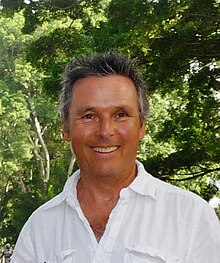Jonathan Potter
| Jonathan Potter | |
|---|---|

Jonathan Potter in Sydney Easter 2009.
|
|
| Born |
8 June 1956 Ashford, Kent |
| Website | [[1] comminfo |
| Academic background | |
| Alma mater | University of Surrey |
| Academic work | |
| Institutions | Loughborough University |
| Main interests | Discursive psychology |
Jonathan Potter (born 8 June 1956) is Dean of the School of Communication and Information at Rutgers University and one of the originators of discursive psychology.
Jonathan Potter was born in Ashford in Kent, and spent most of his childhood in the village of Laughton, East Sussex; his father was a school teacher and his mother was a batik artist. He went to School in Lewes and then on to a degree in Psychology at the University of Liverpool in 1974 where he was exposed to the radical politics of the city, became (briefly) interested in alternative therapies, and responded to the traditional British empirical psychology that was the mainstay of the Liverpool psychology degree programme at the time. He read the work of John Shotter, Kenneth Gergen and Rom Harré and became excited by the so-called crisis in social psychology. This critical work led him to a master's degree in philosophy of science at the University of Surrey where he worked on speech act theory and had a first exposure to post structuralism and in particular the work of Roland Barthes. He read and wrote about Thomas Kuhn, Paul Feyerabend and Imre Lakatos. At the same time philosophy of science provided a pathway to the new sociology of scientific knowledge and in particular to the work of Harry Collins, Michael Mulkay and Steve Woolgar.
In 1979 he applied for a PhD funding at the University of Bath to work with Harry Collins. He was offered a place but in the summer of 1979 the offer was withdrawn after the incoming Thatcher government cut the budget for social science. He started a part-time PhD with Peter Stringer in Psychology at the University of Surrey while also working on a project on the experience of overseas tourists to Bath bed and breakfast hotels. In this period he met and started to live with Margaret Wetherell who was doing a PhD with John Turner who, with Howard Giles and Henri Tajfel, was a key figure in British social psychology. He took part in the vibrant intellectual culture of social psychology in Bristol at the time although he was a lone voice against the broadly experimental focus of Bristol tradition of so-called European Social Psychology.
...
Wikipedia
